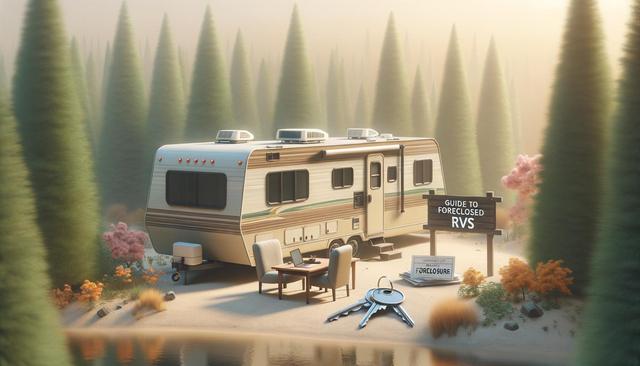Understanding What a Foreclosed RV Is
A foreclosed RV is a recreational vehicle that has been repossessed by a lender after the previous owner defaulted on the loan. Once the lender takes ownership, the RV is typically resold to recover the remaining balance of the loan. These vehicles can be found through auctions, dealers, banks, or online marketplaces. While the price tag can be attractive, it’s crucial to understand that these RVs are usually sold ‘as-is,’ which means there are no warranties or guarantees about their condition. Buyers need to be cautious and informed to make a smart investment.
Several types of foreclosed RVs are available, including motorhomes, travel trailers, fifth wheels, and camper vans. Each type serves different needs and lifestyles, so identifying the right kind for your intended use is a key first step. Also, foreclosed RVs may have been neglected or stored improperly, increasing the need for a thorough inspection before purchase.
Where to Find Foreclosed RVs
There are several avenues for purchasing foreclosed RVs, and each comes with its own set of advantages and challenges. Some common sources include:
- Bank or credit union repossession sales
- Online auction platforms
- RV dealerships with repo inventory
- Government or law enforcement auctions
While online platforms offer convenience and a wide selection, they may lack transparency regarding the vehicle’s condition. In contrast, local dealerships might allow physical inspections or even basic servicing before the sale. Government auctions are often less competitive, but may require more legwork to attend and bid. Always ensure that you are using a reputable source, especially when dealing with online listings.
What to Look for During Inspection
When considering a foreclosed RV, inspection is one of the most critical steps. Since these vehicles may have been sitting unused or maintained poorly, a detailed examination can help you avoid costly surprises down the road. Some key areas to inspect include:
- Roof and exterior for signs of water damage or rust
- Plumbing and electrical systems
- Interior components like appliances, flooring, and furniture
- Engine and drivetrain if it’s a motorhome
Hiring a certified RV inspector is often a wise investment, especially if you’re unfamiliar with RV mechanics. If possible, request maintenance records or any available history of the vehicle. These steps help you assess whether the asking price justifies the vehicle’s current condition.
Financing and Costs to Consider
Though foreclosed RVs are typically more affordable than new or even used ones from dealers, there are additional costs that buyers should budget for. In many cases, the RV may require repairs or upgrades to make it roadworthy or comfortable for travel. These expenses can add up quickly, especially for older models or those with significant wear and tear.
Financing a foreclosed RV may also present different challenges. Some lenders are hesitant to finance repossessed vehicles due to their uncertain condition. You may need to explore options such as:
- Personal loans
- Credit union financing
- Dealer-arranged financing, if available
Before making a purchase, get a clear understanding of the total cost, including taxes, registration, insurance, and any needed repairs. This approach will help you avoid going over budget and ensure a smoother transition into RV ownership.
Tips for a Successful Purchase
To make the most of your investment in a foreclosed RV, preparation and research are key. Always start by setting a realistic budget that includes both the purchase price and potential post-sale expenses. Next, compare listings across multiple sources to ensure you’re getting a fair deal. Don’t rush into a purchase, especially if you haven’t had the chance to inspect the RV thoroughly.
Here are a few more tips to guide your buying process:
- Check the RV’s VIN for any accident or title issues
- Understand the local DMV requirements for titling and registering a repossessed vehicle
- Look for online forums or communities where others share their experiences with similar purchases
- Ask the seller about the RV’s storage history, as long-term disuse can lead to hidden issues
Knowledge is your most powerful tool when navigating the foreclosed RV market. Each purchase opportunity is unique, so keeping a flexible but cautious approach can help you make a well-informed decision.
Conclusion: Weighing Opportunity with Caution
Buying a foreclosed RV can be a financially sensible way to enjoy the RV lifestyle, but it’s not without challenges. From understanding the source of the repossession to inspecting the vehicle and arranging financing, every step requires attention and care. With thorough research and a clear plan, you can uncover a vehicle that meets your travel goals while staying within budget. This guide offers a foundation for navigating the process confidently, enabling you to make a purchase that aligns with both your needs and expectations.


